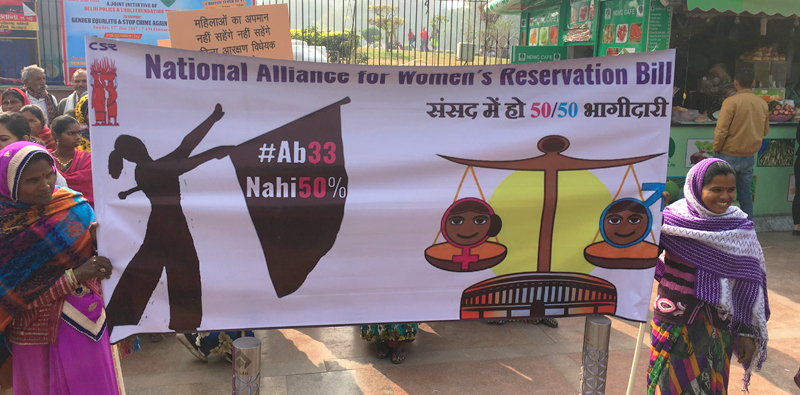The Women’s Reservation Bill or The Constitution (108th Amendment) Bill, 2008, proposes to reserve 33% of the seats in the Lok Sabha and all state legislative assemblies for women, on a rotational basis, which would be determined by a draw of lots, in such a way that a seat would be reserved only once in three consecutive general elections. The bill was first introduced in 1996, by the United Front Government of H.D. Deve Gowda, was passed by the Rajya Sabha in 2010. It is yet to be passed by the Lok Sabha, and the ongoing monsoon session has seen support across political parties, for the passage of the bill in the Parliament. Such a reservation policy for women has already been implemented at the panchayat and the municipal level in 1993 under the 73rd and the 74th amendment, following which there has been a steady inflow of women into politics at a local level.


A recent report published by The Quint on a study conducted by the Inter-Parliamentary Union, on the condition of female representation in Indian politics, reveals the urgent need to pass this bill. According to the report, India occupies the 147th rank, out of a list of 193 countries in terms of female participation in the Upper and Lower Houses of the Parliament. Of the 542 seats in Lok Sabha, women hold only 64, which is approximately 12 %. In the Rajya Sabha, women hold 29 of the available 244 seats.
In addition to this data, various studies have corroborated the links between increasing levels of female participation in politics with effective grievance redressal, greater public expenditure based off complaints made by women , and greater sensitivity to the concerns of women, which goes a long way in trust building. In matters of sexual violence, women tend to be more comfortable reporting a case to another member of the same sex. A study conducted by United Nations University World Institute for Development Economics Research (UN-WIDER) makes linkages between greater economic development in constituencies that elect women.
Keeping such a data with its overwhelming verdict in favour of greater female participation in mind, it is not surprising that there have been increasing instances of support for the passage of the bill. Recently pleas made by parties like CPI(M) and individuals like Rahul Gandhi are not bereft of political motives, but nonetheless underline the pressing urgency to pass the bill. A quote by Dr. Ranjana Kumari in an article published in the Times of India rightly sums up why the bill is the need of the hour, ‘While the enactment of the 73rd and the 74th Constitutional Amendments has facilitated the entry of lakhs of women in villages, small towns and cities, into the political arena was a welcome step, women are still struggling to secure the same in Parliament and state legislatures, which continue to be around 10% and less of the total number of members.’




